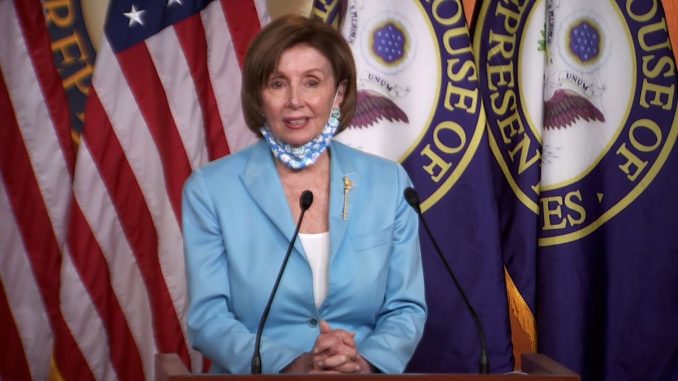
The House on Wednesday passed a bill to establish a commission to investigate the Jan. 6 attack on the Capitol, earning relatively little support from Republicans as GOP leaders sought to quash a bill negotiated by one of their own members.
Lawmakers passed the bill in a 252-175 vote, with 35 Republicans joining all Democrats in support.
The legislation’s chances appear increasingly slim in the Senate after both Senate Minority Leader Mitch McConnell (R-Ky.) and House Minority Leader Kevin McCarthy (R-Calif.) came out in opposition to the bill.
The GOP leaders’ refusal to back the bill threatens the chances of the proposed commission becoming law as many Republicans seek to divert attention from former President Trump’s role and their own involvement echoing his false claims of election fraud leading up to the insurrection.
McCarthy insisted that the legislation should have expanded its scope, arguing it “ignores the political violence that has struck American cities, a Republican Congressional baseball practice, and, most recently, the deadly attack on Capitol Police on April 2, 2021.” Expanding the commission’s focus would dilute the focus on Trump.
The GOP leader’s opposition came even though the legislation was negotiated by the top Republican on the House Homeland Security Committee, Rep. John Katko (N.Y.), and largely mirrors a GOP bill introduced in January to establish a bipartisan commission focused on the Jan. 6 attack that led to the deaths of five people and injuries to more than 140 police officers.
But unlike most of his cohorts, Katko is a moderate who was one of the 10 Republicans who voted to impeach Trump for inciting the violent mob that tried to forcibly stop Congress from certifying President Biden’s electoral victory.
“I urge all of you in the body, all of you on both sides — not just my side, not just your side, all of us — to set aside politics just this once … and pass this bill,” Katko said in an impassioned floor speech.
Katko pleaded with lawmakers to think of the police officers who died or were injured while defending the Capitol from the mob.
“Imagine being a family member of these officers who do this. So let’s take a deep breath and think about what’s really important here. These people every single day are willing to lay down their lives for us. They deserve better,” he said.
Relatively few Republicans participated in floor debate on the commission legislation, with Katko, who was managing time for Republicans, repeatedly reserving time.
While only a handful of Katko’s fellow Republicans spoke in support of the bill he negotiated, Democrats repeatedly praised him as a “true American.”
Democrats emphasized that the compromise bill on the floor on Wednesday incorporated GOP demands that the commission include an equal ratio of Democrats and Republicans and coequal subpoena power. Katko had rebuffed an earlier proposal from Speaker Nancy Pelosi (D-Calif.) that would have allowed Democrats to appoint seven members over four for Republicans.
When asked if Democrats would reserve the right to turn to ongoing congressional investigations where they have full subpoena power if Wednesday’s bill doesn’t become law, Pelosi said she’d prefer to also have a commission with bipartisan credentials.
Members of the commission would have to be experts in intelligence, law enforcement, counterterrorism or related fields and could not be currently serving in government. They’d be tasked with issuing a final report by the end of this year.
“What is important, and the reason I was willing to — we as a group were willing to — yield on certain points which we thought were, shall we say, contradictory to past Republican behavior when it came appointing commissions was that we wanted the American people to have the fullest confidence in the product that there is,” Pelosi said ahead of the vote.
McConnell further dimmed the bill’s prospects in the Senate Wednesday, calling the bill a “slanted and unbalanced proposal.”
“There is, has been and there will continue to be no shortage of robust investigations by two separate branches of the federal government,” McConnell said.
“It’s not at all clear what new facts or additional investigation yet another commission could actually lay on top of existing efforts by law enforcement and Congress,” he added.
And before McConnell’s announcement on Wednesday, Trump issued a statement on Tuesday night opposing the commission that specifically called out the top two GOP leaders.
“Republicans in the House and Senate should not approve the Democrat trap of the January 6 Commission. … Republicans must get much tougher and much smarter, and stop being used by the Radical Left. Hopefully, Mitch McConnell and Kevin McCarthy are listening!” Trump said in the statement.
Nevertheless, Senate Majority Leader Charles Schumer (D-N.Y.) affirmed Wednesday that he will bring up the legislation for a vote.
“It will be on the Senate floor, and we’ll see where our Republican friends stand. Will they stand with the truth, or will they stand with the big lie?” Schumer said.
The tension in Congress over creating the commission stands in stark contrast to outside voices largely unified in the call for an independent commission to investigate the event.
More than 140 national security leaders who served under Democratic and Republican administrations called for such a commission in April, saying such a review was “critical to preventing future attacks.”
And former members of the 9/11 Commission — which the bill was modeled after — slammed Republicans for trying to rope in events that happened as far back as four years ago.
“Jan. 6 was a highly unique event. It is different than almost any other time in our nation’s history,” said Tim Roemer, a former Democratic congressman who served on the 9/11 Commission.
“That is an extraordinarily different situation than what some people are talking about in terms of protests in cities,” he added.
Via The Hill


